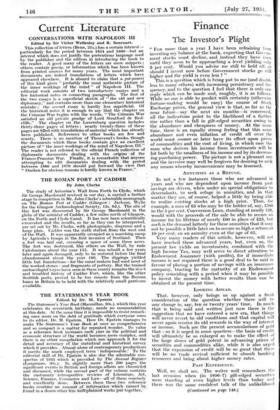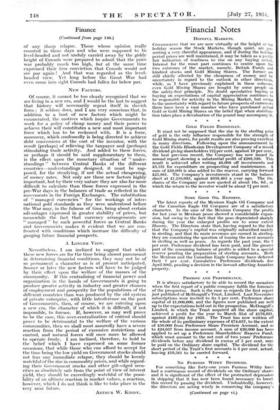Finance
The Investor's Plight.
" FOR more than a year I have been refraining from investing my balance at the bank, expecting that Govern- ment stocks must decline, and instead they have risen until they seem to be approaching a level yielding only 8 per cent. Would you advise me still to hold off, or should I invest now before Government stocks go still higher and the yield is even less ? " This is a question which is being put to me (and doubt- less to many others) with increasing persistency and fre- quency, and to the question I feel that there is only one reply which can be made and, roughly, it is as follows. While no one is able to predict-with certainty (otherwise fortune-making would be easy) the course of Stock Exchange prices, the general view is that, so far as the near future—say , the next six months—iS 'concerned, all the indications point to the likelihood of a further rise rather than a fall in gilt-edged securities owing to the abundance and cheapness of money. At the same time, there is an equally strong feeling that this same abundance and even inflation of credit all over the world must sooner or later have its effect upon prices of commodities and the cost of living, in which case the man who derives his income from investments will be hit both by the smallness of his income and by its decreas- ing purchasing power. The picture is not a pleasant one and the investor may well be forgiven for desiring to seek any means whereby inconvenience may be lessened.
ANNUITIES AS A REFUGE.
In not a few instances those who are advanced in years and who are dependent upon income from past savings are driven, when under no special obligations to descendants, to seek refuge in annuities, and in that matter they are, of course,' helped a little by being able to realize- existing stocks at a high price. Thus, for example, a man of 65 who may be the holder of, say, £500 in the 5 per cent. Conversion Loan, standing at nearly 120, would with the proceeds of the sale be able to secure an income for his lifetime of nearly £60 in place of £25, but such is the demand latterly for these annuities that it may not be possible a little later on to secure so high-a return as 10 per cent. on an annuity even at the age 'of 65.
Very many readers of this article, however, will not have reached these advanced years, but, even so, the present low yields on investments, combined with the high Income Tax, may well serve to direct attention to Endowment Assurance (with profits), for if immediate income is not required there is a good deal to be said in favour. of placing a portion •of savings with an insurance company, trusting to the maturity of an EndoWment policy coinciding with a period when it may be possible to invest the money with better results than can be obtained at the present time.
. LOOKING AHEAD.
That, however, only brings us up against a fresh 'consideration of the question whether there will be any change in, say.; ten or twenty years' time. In much that is being said and written just now there is the suggestion that we have entered a new, era, that things will never revert to old conditions and that capital will never again receive its old rewards in the way of interest or income. Such are the present accumulations of gold that—so it is urged in some quarters—the basis of credit will ultimately be so enlarged as to make the effect of the large stores of gold potent in advancing prices of securities and commodities alike, while it is also urged that the expansion of credit will be so great that there will be no trade revival sufficient to absorb banking resources and bring about higher money rates.
. PAST EXPERIENCE.
Well, we shall see. The writer well remembers the last occasion when (in 1896-7) gilt-edged securities were standing at even higher levels than today and there was the same confident talk of the unlikelihood
(Continued on page 148.)
Finance
(Continued from page 146.) of any sharp relapse. Those whose opinion really counted in those days and who were supposed to be level-headed and not unduly carried away by the giddy height of Consols were prepared to admit that the price was probably much too high, but at the same time expressed their firm conviction that Consols would not see par again ! And that was regarded as the level- headed view. Yet long before the Great War had even come into sight Consols had fallen far below par.
NEW FACTORS.
Of course, it cannot be too clearly recognized that we are living in a new era, and I .would be the last to suggest that history will necessarily repeat itself in slavish form : it seldom does, and I am very conscious that, in addition to a host of new factors which might be enumerated, the motives which inspire Governments to work for a policy of cheap- money and their power to achieve their will constitutes a new and most important force which has to be reckoned with. It is a force, moreover, which confessedly is being directed to achieve debt conversions at 'the cost of the investor, with the result (perhaps) of relieving the taxpayer and (perhaps) stimulating trade activity. And added to these forces, or perhaps it should be said supplementary to them, is the effect upon the monetary situation of " under- standings " between Central Banks of the different countries—understandings designed, it must be sup-. posed, for the steadying, if not the actual cheapening, of money rates. Not only are these new factors highly important, but by their very nature they are also far more difficult to calculate than those forces expressed in the pre-War days in the balances of trade as reflected in the movements in the Foreign Exchanges. The substitution of " managed currencies " for the workings of inter- national gold standards as they were understood before the War may, in the fulness of time, bring about certain advantages expressed in greater stability of prices, but meanwhile the fact that currency arrangements are " managed " by such powerful forces as.Central Banks and Governments makes it evident that we are con- fronted with conditions which increase the difficulty of gauging future financial prospects.
A LONGER VIEW.
Nevertheless, I am inclined to suggest that while these new forces are for the time being almost paramount in determining financial conditions, they may not be of so permanent a character as is at present anticipated. Sooner or later the new factors will have _to be judged by their effect upon the welfare of the masses of the community. If this centralizing of financial power and organization in the hands of Governments is going to produce-.greater activity in industry and greater chances of employment and prosperity for the populations of the different countries than was produced by the old system of private enterprise, with little interference on the part of Governments, then, of course, we are entering upon a new era, the character of which it is difficult, if not impossible, to foresee. It however, as niay well prove to be the case, this over-centralization of control should prove to be detrimental to the welfare of the various communities, then we shall most assuredly have a severe reaction from the period of excessive restrictions and control, and natural forces will once more be allowed to operate freely. I am inclined, therefore, to hold to the belief which I 'have expressed on some former occasions, that while -those who can afford to accept for the time being the low yield on Government stocks should not fear any immediate relapse, they should be keenly watchful of the rise in commodity prices, and while regard- ing their Government stocks and other gilt-edged secu- rities as absolutely safe from the point of view of interest yield, they should be exceedingly watchful of the possi- bility of an ultimte reaction in market values, a reaction, however, which I do not think is like to take place in the Very near future. ARTHUR W. KIDDY.



































 Previous page
Previous page